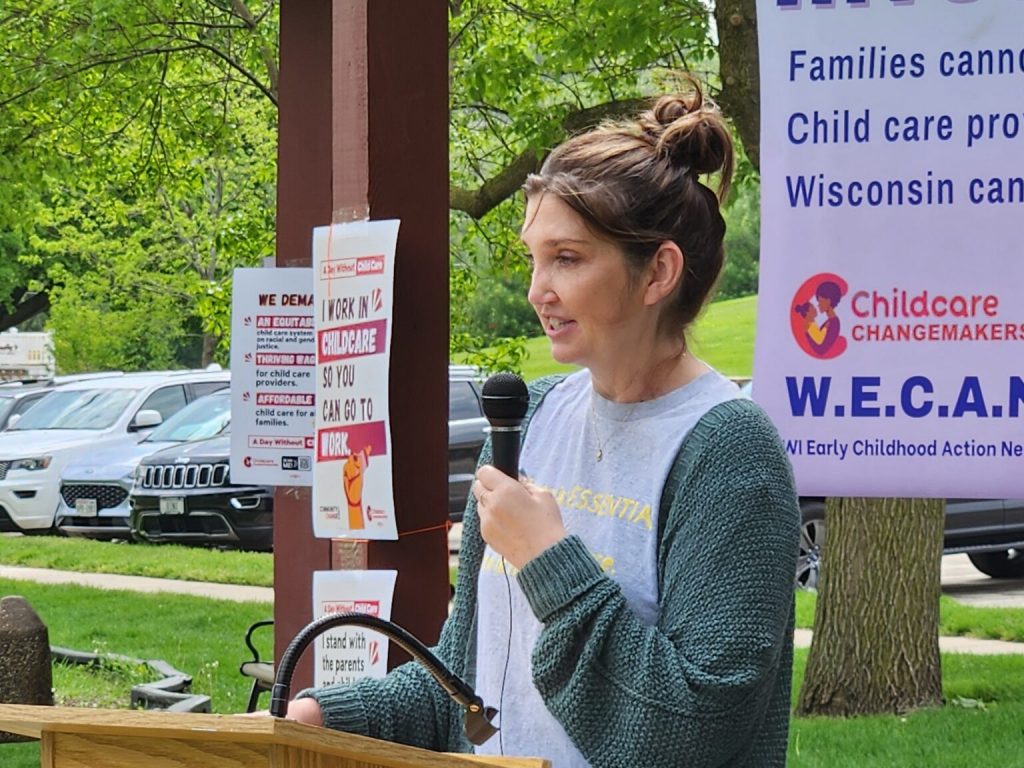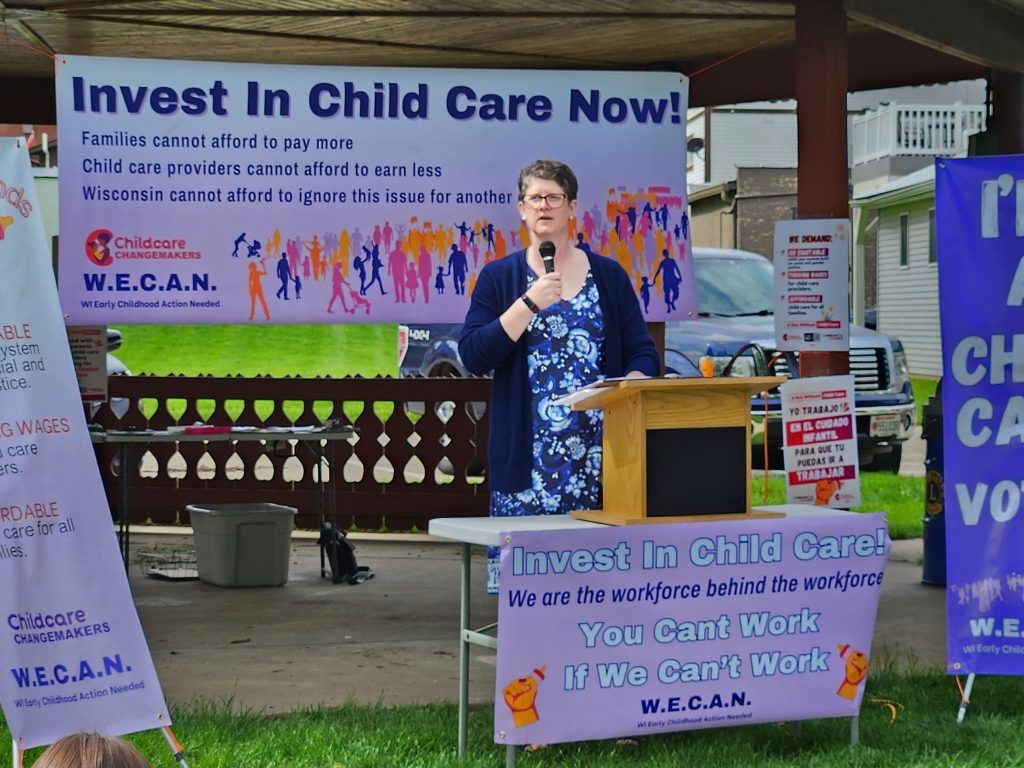Child Care Providers Renew Call for State Funding
Programs struggling to survive. Evers supports more funding, GOP legislators don't.

Brooke Legler, a child care provider and advocate, addresses a rally in New Glarus to call for public investment in child care. (Erik Gunn | Wisconsin Examiner)
A year after the state Legislature’s budget committee rebuffed demands for a major cash infusion to sustain Wisconsin’s child care sector, providers say they’re struggling to survive and child care resources remain stretched thin.
“We are hearing just an endless story about child care programs that cannot hire and cannot retain staff, more classroom closures, increased rates of pay for parents,” said Ruth Schmidt, executive director of the Wisconsin Early Childhood Association (WECA).
On Monday, providers, parents and advocates gathered across the state to call attention to the continued challenges child care providers and families face. The events, part of a nationwide campaign called “A Day Without Child Care,” were held to rally support for expanding access and improving affordability for working families who need child care.
At one of those events, held in New Glarus, speakers emphasized that the early education trained child care workers provide helps children’s brains develop and helps them gain social and emotional skills that allow them to thrive throughout their school years.
“Kids who get high quality early care and educational opportunities, they do better in school, they’re more likely to graduate,” said Jeff Pertl, deputy secretary of the Wisconsin Department of Children and Families (DCF). “They earn more in their lifetime. They’re less involved in criminal activity. They need fewer special education supports and interventions. They grow and thrive because caring, stable adults are there to take care of them.”
Sarah Kazell, a child care worker and volunteer advocate, argued that early education is a public good that merits public investment along with K-12 education.
“This is the reality of a lack of public investment in early education,” Kazell said. “Women like me are earning a poverty wage to do it. And we are effectively subsidizing the ability for any middle class family to afford care at all. That’s the subsidy program that America has right now — it’s exploitative labor of the people who provide the care.”
The New Glarus event was organized by Corrine Hendrickson and Brooke Legler, who operate child care centers in the community. The pair founded Wisconsin Early Childhood Action Needed (WECAN), an advocacy group, to marshal support for providers and families.
Along with other advocates, they reminded their listeners that 2024 is an election year. They offered materials to help people contact their legislators and make an appeal for robust state support for child care.
“In November, we need to think about and research who we are voting for and make sure that they align with our own values,” Legler told the crowd.
A workforce necessity
Child care makes it possible for more people to enter the job market, advocates said. State Rep. Mike Bare (D-Verona), whose district included New Glarus until the legislative maps were redrawn this year, said in an interview that the community’s largest employers have cited housing for workers along with child care as their top concerns when it comes to hiring and keeping employees.
The same is true of Wisconsin’ teacher workforce, state schools Superintendent Jill Underly told the rally.

Wisconsin Department of Public Instruction Superintendent Jill Underly addresses a rally in New Glarus to support a stronger state investment in child care. (Wisconsin Examiner photo)
In a recent Department of Public Instruction (DPI) report, “teachers tell us that the lack of access to affordable, high quality child care is a barrier for them to return to the classroom after having kids of their own,” Underly said. “We cannot afford to continue to lose amazing teachers because they cannot afford child care. And of course these effects are similar for lots of other families across Wisconsin.”
The COVID-19 pandemic exposed and exacerbated challenges that providers faced for years. Keeping fees affordable for families kept providers from raising wages, which made hiring workers more difficult, according to advocates.
During the same period the number of licensed family care providers — who care for up to eight children in their homes — also fell by about 25%, from just under 2,000 to less than 1,600. The number of certified family providers — who care for three or fewer children and who are certified typically by counties rather than licensed — has fallen even more dramatically, from nearly 1,400 to just over 500 — a 60% drop.
The loss of family providers “really disadvantages rural populations in significant ways,” according to Schmidt, the WECA director, because those communities cannot support larger centers the way urban communities can.
Providers stabilize — but strain persists
With the pandemic, the strain increased. Providers lost workers due to illness or fear of illness. Some parents working at home decided to forgo the cost of care. Others, unable to get care, decided to cut back their jobs.
At the same time, though, because of the pandemic the state and federal governments offered greater support to providers. In Wisconsin that came in the form of Child Care Counts — a $20 million-per-month subsidy to child care providers funded by the 2021 American Rescue Plan Act (ARPA).
Over the subsidy program’s nearly four-year span, some centers have opened and others closed, but the number of providers has held relatively steady, in the range of 4,600.
The capacity of those providers is about 177,500 children, according to DCF. That might overstate the actual number of openings, however. DCF’s child care dashboard lists capacity based on a provider’s license, according to the department’s communications director, Gina Paige.
Gov. Tony Evers proposed continuing the Child Care Counts program with $340 million — first in the 2023-25 state budget, and when the Legislature’s Republican majority declined, in a special session bill later in 2023 that also was rejected by the GOP majority.
The Evers administration has since been able to extend Child Care Counts, but at about half its original size, repurposing $170 million in ARPA funds that were not spent elsewhere. That has continued the program into mid-2025.
At the New Glarus rally, Kazell criticized the lawmakers who ignored those proposals despite a vigorous campaign by child care providers and families.
“When we meet with them and ask for state investments to stabilize our workforce — because we are the workforce behind the broader workforce — we are told that we should just be doing it for the children, not for the money,” Kazell said. “And we are treated as though the broken child care market is our fault for running our businesses badly, instead of the natural consequence of letting a public good languish in the private market.”
Advocates now are focusing on a federal proposal for a $16 billion child care stabilization program, Hendrickson told the New Glarus audience. At the same time, they’re starting to prepare for the 2025-27 budget.
Pertl, the DCF deputy secretary, told the rally that the current Child Care Counts extension would “give us one more chance to go back to the Legislature and build a sustainable future for child care.”
Schmidt told the Wisconsin Examiner that she expects Evers to include “a big ticket item for child care” in his proposal for next year’s budget.
“The state did some really cool, wonderful, great work to help stand up child care during this time,” Schmidt said of the last three years. “And it was still hard for families to find. And it was still hard for families to pay for. And so when you roll back the growth and the benefits of what we’ve done in the past couple of years with all this investment of our funds — I don’t know how we think we’re going to retain a workforce in child care.”
Child care providers hang on, renew call for strong public support was originally published by Wisconsin Examiner.






















“Those kids shouldn’t be in daycare, they should be working! We’ll get rid of those pesky child labor laws to fix the workforce problem!” – the Republican Party of Wisconsin, probably
The WI Republican Legislature has a strangle hold on our tax dollars.
They give tax breaks to millionaires in exchange for campaign donotions.
SCOTUS legalized bribery with Citizen United
People can’t work without Childcare.